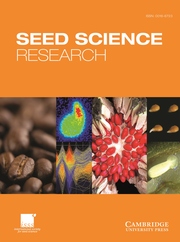Article contents
Effect of insulin on the cell cycle of germinating maize seeds (Zea mays L.)
Published online by Cambridge University Press: 11 January 2013
Abstract
During seed germination, metabolism is reactivated, DNA is repaired and cell division is restarted in the meristems. The mechanisms that co-ordinate cell growth and division in maize embryonic axes during germination are not well understood. However, the presence of a factor similar to IGF (insulin-like growth factor) that accelerates germination has been reported. In the present work, the regulation of the cell-cycle restart by bovine insulin [which has been demonstrated to produce similar effects as insulin-like growth factor of maize (ZmIGF) in maize seeds] was studied in germinating embryonic axes. Our results showed that bovine insulin differentially stimulates growth, S6K phosphorylation, S6rp transcript accumulation on the polysomal fraction, as well as de novo DNA synthesis in the radicles and the coleoptiles of the embryonic axis. A stronger and earlier effect was observed in radicles compared to coleoptiles; therefore, the effect of insulin on the cell cycle of the root meristem was studied by flow cytometry. The G1–S transition was stimulated and cell proliferation was induced. Furthermore, it was determined by quantitative reverse transcription-polymerase chain reaction (qRT-PCR) that bovine insulin increased E2F and PCNA (proliferating cell nuclear antigen) transcription after 15 h of germination and PCNA de novo synthesis at 15 h of germination. These results show that bovine insulin preferentially stimulates growth in the radicles of germinating embryonic axes and suggest that its effect on the G1–S transition and the activation of cell proliferation is mediated by the induction of E2F and PCNA transcription.
Keywords
Information
- Type
- Research Papers
- Information
- Copyright
- Copyright © Cambridge University Press 2013
References
- 7
- Cited by

